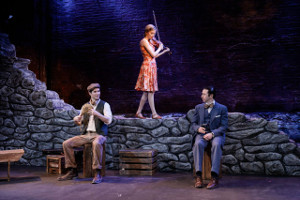| A
Walk with Mr. Heifetz
 |
| Yuval Boim, Mariella Haubs, and Adam Green. Photo
by James Leynse. |
“A Walk with Mr. Heifetz”
by James Inverne
directed by Andrew Leynse
produced by Primary Stages at the Cherry Lane Theatre,
38 Commerce St., NYC.
Jan. 31 - Mar. 4, 2018. Wed.-Sat. at 8:00; Sat. at 2; Sun. at 3:00.
$70.00
For tickets and information, call 212-352-3101, 866-811-4111
or visit http://primarystages.org/shows or the box office.
On hearing Yascha Heifetz at his debut performance, Fritz Kreisler,
a leading violinist, said "We might as well take our fiddles
and break them across our knees." Heifetz was 12 years old. Judged
the single most influential player of the last 100 years, Heifetz
redefined the art of the violin. He’s a fascinating man!
Although Heifetz is one of the three characters (plus the violinist
Mariella Haubs) in “A Walk with Mr. Heifetz,” the discussions
of art and statehood are filtered through Yehuda Sharett, (Yuval Boim)
who is an enthusiast, a kibbutznik and a musician. It is a clever
structure that enables playwright James Inverne to ponder some interesting
thoughts. Thoughts are the finest aspect of the production. The weakest
is the drama.
The play opens in Israel, 1926. After Heifetz’s concert, Yehuda,
persuades the maestro to walk the hills of Israel (then Palestine)
with him. He hopes the beauty of the landscape will convince Heifetz
to relocate from the United States.
More passionate than diplomatic, the young man and the icon discuss
art, identity, and sacrifice. Heifetz talks about his early life and
offers advice. Music, he tells the young man, is not a part-time activity.
But Yehuda is busy building a new country, working in the fields all
day and rehearsing the kibbutz choir most nights. His arrangements
of Passover tunes have become popular in other kibbutzim. Heifetz
advises him to study with the best – in Germany. Yehuda’s
political and aesthetic dreams in collision, he is surprised to find
that he is the one who will consider emigration.
Act II opens in that difficult period after the Holocaust but before
Israel has been granted statehood. We meet Yehuda in a deep depression,
having lost his wife and other family members in a terrorist bombing.
He refuses to leave his apartment. Moshe Sharett, who will become
Israel’s prime minister in 1954, is trying to rouse his brother
by illustrating the importance of music in the new country. He talks
about how the Israelis discovered the lively “Hatikva”
(“The Hope”), its national anthem, how the right song
builds morale. And then he tells him about inmates in a concentration
camp who hummed one of Yehuda’s tunes to keep their spirit alive.
The production has two distinct strengths: Heifetz’s remarks
on art and the implicit discussion of leadership in the Diaspora,
especially in the late 1940s as Israel moves from dream to political
entity. Each actor has a distinct accent – Israeli for the new
nation, British for the education of Moshe Sharett, and what sounds
like a mix of American and Slavic for Heifetz – a shorthand
for the gathering of clans from the four corners of the world into
the nation.
The second strength is the surprising talent of Adam Green as the
rather stern composer. Whenever Green spoke, we could hear the nuances
– Heifetz’s suffering and loneliness as a boy, the passion
for his craft, the absolute faith in music. Although it is not written
in the script (and probably should be), he seems drawn to the young
Israeli’s zeal and naivete. Erik Lochtefeld as Moshe Sharett
was fine as the troubled brother, but Yuval Boim as Yehuda, the protagonist,
offered a very weak performance in a weak role. Mariella Haubs, a
graduate of Juilliard, studied with Itzkak Perlman and Catherine Cho,
offered a gracious musical commentary on the script.
|


